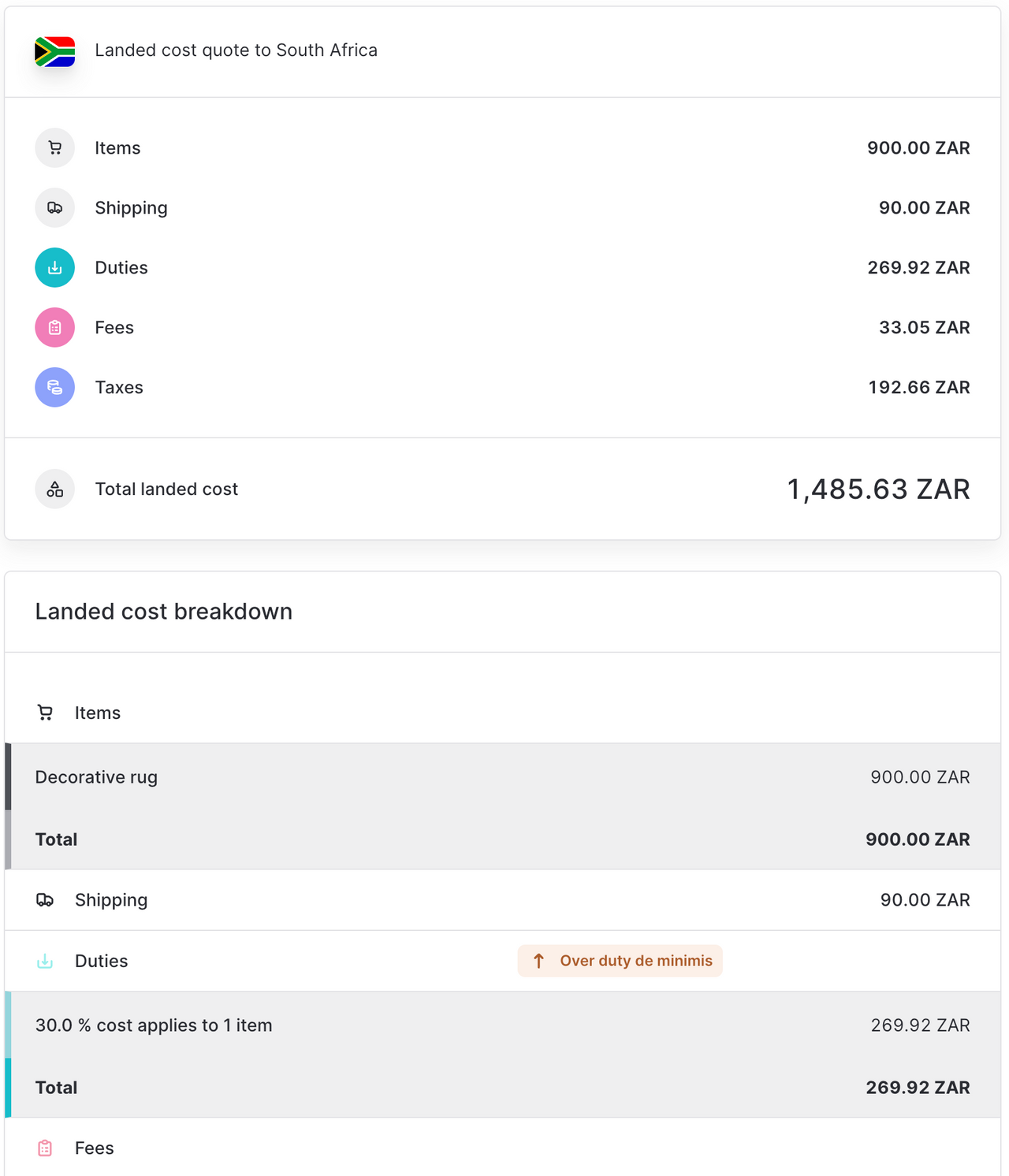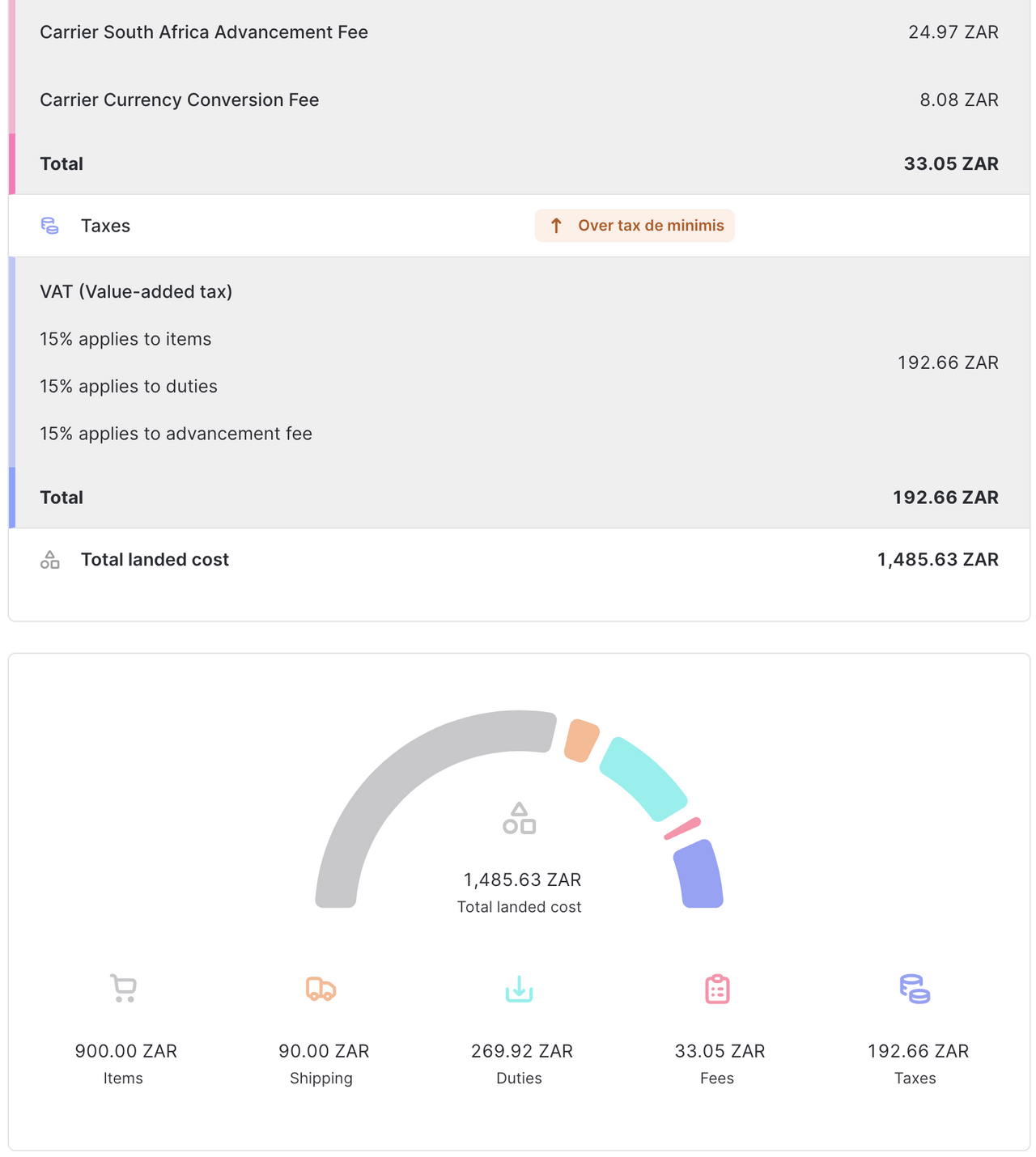Ease of importing goods score: D
Ease of doing business 2/5
- South Africa has a well-developed infrastructure and is the most advanced, diverse, and productive economy in Africa.
- South Africa’s currency has unpredictable and complicated exchange rates.
- South Africa imposes tariffs to prioritize local goods due to the conservative market bias.
Landed cost fairness 2/5
- The duty and tax rates are moderate.
- South Africa’s de minimis is zero, so duty and tax will be charged on every import, which can result in a high landed cost.
Flexibility of legal regulations 2/5
- South Africa has a complex import process.
- The South African Revenue Service (SARS) has many strictly enforced tariff codes.
- New sellers are strongly encouraged to work with a customs clearance agent.
Availability and accessibility of shipping 5/5
- South Africa’s coast borders the South Atlantic and Indian Ocean.
- South Africa has many carrier options and services due to the high-traffic European-Asian sea route, Cape Route, which runs from the European coast to Asia’s coast, passing by the southern edge of Africa.
Accessibility and variety of payment methods 5/5
- South Africa accepts a variety of online paymentcards methods, such as cash, credit cards, bank transfers, and ewallets.
Market opportunity 3/5
- South Africa’s well-developed economy and infrastructure make for a desirable market.
- Only slightly above half of South Africa's population has internet access and only half are ecommerce users, which makes for an unfavorable market.
Key stats for South Africa
| Population | 59.9 million (2022) |
| GDP | 419.02 billion USD (2022) |
| GDP per capita | 5,947.89 USD (2022) |
| Internet penetration | 68.7% of the population use the internet (2022) |
| Ecommerce users | 50% of the population shop online (2022) |
| Leading product categories | Clothing; household appliances; electronics; footwear; and health products |
| Preferred online payment method(s) | Credit cards, bank transfers, ewallets, and cash |
| Languages | South Africa recognizes 11 official languages (from most popular to least): isiZulu, isiXhosa, Afrikaans, English, Sesotho sa Leboa (Sepedi), Setswana, Sesotho, Xitsonga, siSwati, Tshivenda, and isiNdebele |
| Currency | South African rand / ZAR / R |
Landed cost for South Africa
The landed cost for a cross-border transaction includes all duties, taxes, and fees associated with the purchase. This includes:
- Product price
- Shipping
- Duties
- Taxes
- Fees (currency conversion, carrier, broker, customs, or government fees)
South African de minimis, tax, and duty
Explanation of duty, tax, and de minimis is provided below
FOB: FOB (freight on board or free on board) is a valuation method for calculating import taxes or duties where the fees are calculated only on the cost of the goods sold. FOB is not calculated on the shipping, duty, insurance, etc.
Duty and tax de minimis
- Duty and tax de minimis: 0 ZAR
Based on the FOB value of the goods
De minimis value
Duty and tax will be charged only on imports into South Africa where the total FOB value of the import exceeds South Africa's minimum value threshold (de minimis). However, South Africa has a de minimis of 0 ZAR, which means duty and tax fees are charged on all imports. The only time goods are exempt from duty and tax is when they receive preferential treatment through trade agreements.
Import tax
- Standard rate: 15%
Applied to the FOB value of the goods
Value-added tax (VAT)
South Africa has a VAT rate of 15%; however, the total VAT amount is calculated based on the added-tax value (ATV).
Added-tax value (ATV): The amount of VAT paid on imported goods depends on the ATV, which is determined as follows:
Customs value (total value of goods), plus any duty levied on the goods, plus 10% (0.1) of the customs value, multiplied by the VAT rate of 15% (0.15)
- USD example: A South African-based consumer orders a water bottle from a non-domestic ecommerce site. The total customs value of the item is 23 USD.
- A 6% duty is levied on the water bottle: (23 USD x 0.06)= 1.40 USD.
- Then calculate the 10% of the customs value: (23 USD x 0.1) = 2.30 USD.
- Add everything together: (23 USD + 1.40 USD + 2.30 USD) = 26.70 USD.
- Then multiply that total by the 15% VAT rate: (26.70 USD x 0.15). The total VAT paid on this water bottle would be ~4 USD.
- ZAR example: A South African-based consumer orders a water bottle from a non-domestic ecommerce site. The total customs value of the item is 365 ZAR.
- A 6% duty is levied on the water bottle: (365 ZAR x .06) = 21.90 ZAR.
- Then calculate the 10% of the customs value: (365 ZAR x 0.1) = 36.50 ZAR.
- Add everything together: (365 ZAR + 21.90 ZAR + 36.5 ZAR) = 423.40 ZAR
- Then multiply that total by the 15% VAT rate: (423.40 ZAR x 0.15). The total VAT paid on this water bottle would be ~63.51 ZAR.
Import duty
- Average rate: 5.8%
- Range: 0-50%
Applied to the FOB value of the goods
Average duty rate
South Africa has an average duty rate of 5.8%. Tariff rates mostly fall within the 0-50% range, but some are higher (e.g., most apparel items). Nearly all South Africa’s duties are charged based on ad valorem rates.
Here are some commonly imported items and their duty rates:
- Apparel: 40%
- Jewelry: 45%
- Yarns: 15%
- Fabrics: 22%
- Cars, light vehicles, and minibusses: 34%
Any other import fees
Specific excise duties are levied on tobacco, tobacco products, and petroleum products. Duties on alcoholic beverages are set at fixed percentages of the retail prices.
Landed cost examples
Below is a sample landed cost breakdown for South Africa calculated using Zonos Quoter. Since the duty and tax de minimis is 0 ZAR, duty and tax will always apply:
Landed cost for a shipment to South Africa:


Trade agreements
South Africa has at least 13 trade agreements that offer a zero or highly discounted duty rate for goods manufactured in participating countries. The following are South Africa’s most prominent trade agreements:
- Southern African Customs Union (SACU)
- The Southern African Development Community (SADC)
- South African Customs Union, the East Africa Community, and the Common Market of Eastern and Southern Africa (SADC-EAC-COMESA Tripartite FTA)
- African Continental Free Trade Area (AfCFTA)
- The European Union-South African Trade and Development Cooperation Agreement (TDCA) progressive Free Trade Agreement (FTA)
South Africa is a member of the World Trade Organization
As a member of the World Trade Organization (WTO), South Africa must abide by the most-favored-nation (MFN) clause, which requires a country to provide any concessions, privileges, or immunities granted to one nation in a trade agreement to all other WTO member countries. For example, if one country reduces duties by 10% for a particular WTO country, the MFN clause states that all WTO members will receive the same 10% reduction.
Customs resources
South Africa’s Customs authority
Customs refund in South Africa
Customs refund in South Africa
Note: Talk to your carrier about customs refunds.
Shipping and compliance
Top courier services:
- DHL Express
- FedEx
- UPS
- USPS
- Pitney Bowes Standard
- International Priority Drop Off
Depending on the courier, additional shipping fees may include:
- Tracking
- Insurance
- Fuel surcharge
- Remote delivery charge
- Signature fee
- Overweight or oversized fee
- Special handling fee
- Dangerous goods fee
- etc.
Documentation and paperwork
Always required:
-
Commercial invoice (four copies)
-
Carriers require the sender/retailer’s letterhead logo to be included on the commercial invoice for shipments to South Africa. Electronic commercial invoices are fine, but they have to have the logo and signature.
-
Supplier invoices must include a full description of the goods' nature, characteristics, and details that are required to be examined and help determine the import duty and compile statistics.
-
Packing list (three copies)
Sometimes required:
- Declaration of Origin Form, DA59
- Needed for South African imports which are subject to anti-dumping, countervailing, or safeguard duties. South Africa has import restrictions applied to specific countries or territories.
- Country of origin
- It may be necessary for clarification regarding any other documentation pertaining to proof of origin or preferential treatment.
- Insurance certificate (for sea freight)
Prohibited, restricted, and controlled imports into South Africa
Government agencies regulate imports.
Restricted items are different from prohibited items. Prohibited items are not allowed to be imported into a country at all. Restricted items are not allowed to be imported into a country unless the importer has approval or a special license. Controlled goods have military or national security significance.
Prohibited items:
- Ammunition
- Counterfeit goods
- Coffee and coffee samples
- Cotton seeds
- Dangerous goods as defined by IATA (Intl. Air Transport Association)
- Drugs and narcotics
- Drugs, prescription, and non-prescription
- Furniture
- Grain samples
- Plants
- Seeds
- Shoes
- Tea
- Tobacco and tobacco leaves
- Uncut diamonds
- And more
Restricted items:
- Goods intended for resale in order to protect their domestically manufactured goods
- Ashes
- Residues
- Scrap
- Used or second-hand goods
- Waste
Legal regulations for business
Register as an importer
You are required to register for and obtain an Importer Code from SARS if you import goods into South Africa more than three times (of more than 50,000 ZAR each) in a single calendar year (either directly or through a clearing agent or courier company). You’re also required to have an Importer Code if you import goods for resale or any other business. You must apply for Importers Codes, which, if the application is approved, the code is issued by SARS.
Tips for exporting from South Africa
The South African Government has set out regulations required to export successfully.
Frequently asked questions
What are the most popular online stores in South Africa?
The top five most popular online stores in South Africa are as follows: 1. Takealot.com 2. Superbalist.com 3. woolworths 4. mrp.com 5. amazon.com
South Africa country guide
Learn about cross-border ecommerce, shipping, and importing.
If you are looking to grow your ecommerce business into South Africa , you’ve come to the right place. Keep reading to learn everything you need to know about selling goods into South Africa.
, you’ve come to the right place. Keep reading to learn everything you need to know about selling goods into South Africa.